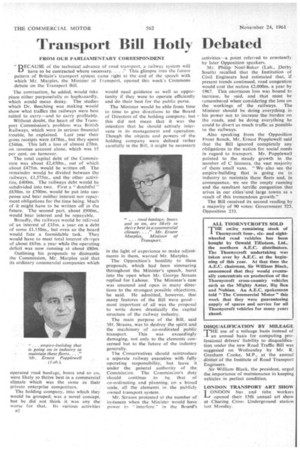Transport Bill Hotly Debated
Page 36

If you've noticed an error in this article please click here to report it so we can fix it.
FROM OUR PARLIAMENTARY CORRESPONDENT
BECAUSE of the technical advance of road transport, a railway system will have to be contracted where necessary. . . ." This glimpse into the future pattern of Britain's transport system came right at the end of the speech with which Mr. Marples, the Minister of Transport, opened this week's Commons debate on the Transport Bill.
The contraction, he added, would take place either purposefully or haphazardly. which would mean decay. The studies which Dr. Beeching was making would show what traffics the railways were best suited to carry—and to carry profitably.
Without doubt, the heart of the Transport Commission's problem was British Railways, which were in serious financial trouble, he explained. Last year their gross receipts were £478m., but they spent £546m. This left a loss of almost £70m. on revenue account alone, which was 15 per cent. on turnover.
The total capital debt of the Commission was about £2,450m., out of which about I475m. would be written off. The remainder would be divided between the railways. £1,575m„ and the other activities; £400m. The railways debt would be subdivided into two. First a " doubtful " £650m. to £700m. would be put into suspense and bear neither interest nor repayment obligations for the time being. Much of it might have to be written off in the future. The second part, about £900m.. would bear interest and be repayable.
Broadly, the railways would be relieved of an interest of £35m. a year on a debt of some £1,150m., but even so the board would face a formidable task. They would have to meet total interest eh,rges of about £65m a year while the operating deficit was now running at about £80m.
Outlining his proposals to dismantle the Commission, Mr. Marples said that its ordinary commercial companies which
operated road haulage, buses and so on. were likely to thrive best in a commercial: climate which was the same as their private enterprise competitors.
The holding company, into which they would be grouped, was a novel concept. but he did not think it was any the worse for that. Its various activities 152
would need guidance as well as opportunity if they were to operate efficiently and do their best for the public purse.
The Minister would be able from time to time to give directions to the Board of Directors of the holding company. but this did not mean that it was the intention that he should actively intervene in its management and operation. Though the objects and powers •of the holding company were defined rather carefully in the Bill, it might be necessary in the light of experience to make adjustments in them, warned Mr. Marples.
The Opposition's hostility to these proposals, which had been simmering throughout the Minister's speech, burst into the open when Mr. George Strauss replied for Labour. The Minister's case was unsound and open in many directions to the strongest possible objections. he said. He admitted, however, that many features of the Bill were good"most important of all was the proposal to write down drastically the capital structure of the railway industry.
The main purpose of the Bill, said Mr. Strauss, was to destroy the spirit and the machinery of co-ordihated public. transport. This was exceedingly damaging, not only to the elements concerned but to the future of the industry generally.
The Conservatives should reintroduce a separate railway executive with fullyoperating responsibility, but leave, it under the general authority of the Commission. The Commiss:on's duty should continue to be. that of co-ordinating and planning,on a -broad scale. all the elements in. the publicly
owned transport system. .
Mr. Strauss protested at the number of -instances when the Minister would have power to interfere" in the Board's activities—a point referred to constantly by later Opposition speakers.
Mr. Philip Noel-Baker (Lab., Derby South) recalled that the Institution of Civil Engineers had estimated that, if present trends continued, road congestion would cost the nation £2,000m. a year by 1967. This enormous loss was bound to increase, be said, and that must be remembered when considering the loss on the workings of the railways. The Minister should be doing everything in his power not to increase the burden on the roads, and be doing everything he could to divert as much traffic as possible to the railways.
Also speaking from the Opposition Front Bench, Mr., Ernest Popplewell said that the Bill ignored completely any obligations to the nation for social needs in regard to transport. Mr. Popplewell pointed to the steady growth in the number of C licences, the vast majority of them small vans. " Wealso see the empire-building that is going on in industry to maintain these fleets and, in consequence. we see the empty running and the resultant terrific congestion that arises in our cities and large towns as a result of this tremendous growth."
The Bill received its second reading by a majority of 90 votes: Government 323, Opposition 233.




















































































































